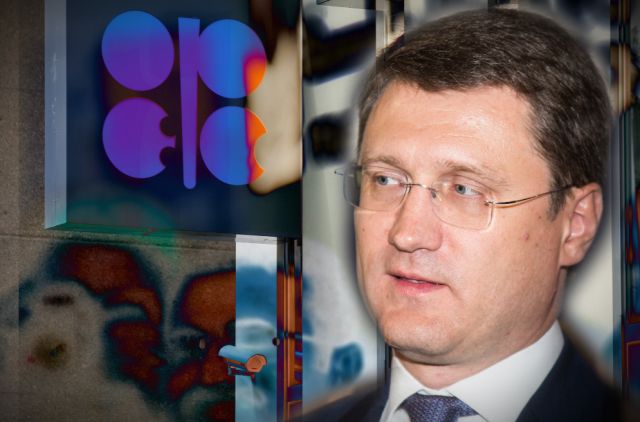
"From April 1 neither OPEC nor non-OPEC have restrictions," Russian Energy Minister Alexander Novak told reporters after marathon talks at the OPEC headquarters in Vienna on March 6. (Photo of Alexander Novak: magicinfoto/Shutterstock.com; Photo of OPEC HQ: Sodel Vladyslav/Shutterstock.com)
[Editor's note: This story has been updated from a previous version posted at 7:45 a.m. CT March 6.]
A three-year honeymoon between OPEC and Russia ended in acrimony on March 6 after Moscow refused to support deeper oil cuts to cope with the outbreak of coronavirus and OPEC responded by removing all limits on its own production.
Oil prices plunged 10% as the development revived fears of a 2014 price crash, when Saudi Arabia and Russia fought for market share with U.S. shale oil producers, which have never participated in output limiting pacts.
Brent has lost about a third of its value this year, tumbling towards $45 a barrel, its lowest since 2017, putting oil-dependent nations and many oil firms under heavy strain as the global economy reels due to the virus outbreak, which has dampened business activity and stopped people traveling.
"From April 1 neither OPEC nor non-OPEC have restrictions," Russian Energy Minister Alexander Novak told reporters after marathon talks at the OPEC headquarters in Vienna on March 6.
Saudi Energy Minister Prince Abdulaziz bin Salman told reporters, when asked whether the kingdom had plans to increase production: "I will keep you wondering."
The failure of talks may have more far reaching implications as OPEC's de facto leader Saudi Arabia and Russia have used oil talks to build a much broader political partnership in the last few years after effectively supporting opposite sides in the Syrian war.
"Russia's refusal to support emergency supply cuts would effectively and fatally undermine OPEC+'s ability to play the role of oil price stabilizing swing producer," said Bob McNally, founder of Rapidan Energy Group.
"It will gravely rupture the budding Russian-Saudi financial and political rapprochement. The result will be higher oil price volatility and geopolitical volatility," he said.
Ultimatum
Talks collapsed after OPEC effectively presented Russia with an ultimatum on March 5, offering it a choice of accepting a deal with much bigger than expected cuts or no deal at all.
Forecasts for 2020 demand growth have been slashed but Moscow has long argued it was too early to assess the impact. Sources said Novak delivered the same message on March 6.
OPEC ministers said March 5 they backed an additional 1.5 million barrels per day (bbl/d) of oil cuts until the end of 2020, in addition to rolling over existing cuts of 2.1 million bbl/d. That would have meant removing a total of about 3.6 million bbl/d from the market, or 3.6% of global supply.
Moscow rejected the proposal on March 6, saying it was only willing to extend existing OPEC+ cuts of 2.1 million bbl/d, which were due to expire at the end of March.
OPEC said it was all or nothing, and hence all limits would expire at the end of the month, meaning that OPEC members and non-OPEC producers can in theory pump at will in an already oversupplied market.
The Kremlin said March 6 President Vladimir Putin had no immediate plans to talk to the Saudi leadership, an announcement that dashed hopes that a deal could be salvaged at the very top.
"This is an unexpected development that falls far below our worst case scenario and will create one of the most severe oil price crisis in history," said Bjoernar Tonhaugen of Rystad Energy.
Recommended Reading
US Drillers Cut Oil, Gas Rigs for Third Week in a Row, Baker Hughes Says
2024-08-30 - The rig count is 8% below this time last year, according to Baker Hughes.
Helix Awarded Vessel Service, Charter Contracts Off Brazil
2024-08-28 - Helix Energy Solutions Group was awarded new three-year charter and service contracts, valued at an estimated $786 million, from Petrobras for Siem Helix 1 and Siem Helix 2.
Shell, Akselos Enter Enterprise Deal for Structural Performance Management
2024-08-28 - Shell Information Technology International will leverage Akselos’ structural performance management software to monitor the health and lifecycle of Shell’s critical assets in Qatar, Canada, the Gulf of Mexico and elsewhere.
From Exxon to APA, E&Ps Feel Need to Scratch Exploration Itch
2024-08-27 - Exxon Mobil is looking for its “next Permian,” which an executive said could be in Algeria.
E&P Highlights: Aug. 26, 2024
2024-08-26 - Here’s a roundup of the latest E&P headlines, with Ovintiv considering selling its Uinta assets and drilling operations beginning at the Anchois project offshore Morocco.




